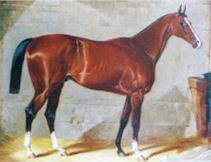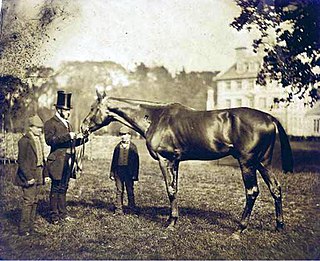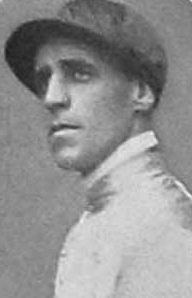Major wins
- Epsom Derby - (1) - Wild Dayrell (1855)
- Prix de Diane - (1) - Jouvence (1853)
- Prix du Jockey-Club - (1) - Jouvence (1853)
| Robert Sherwood | |
|---|---|
| Occupation | Jockey and Trainer |
| Born | 1835 |
| Died | 8 October 1894 Newmarket, Suffolk |
| Major racing wins | |
| Major races (as a jockey) Epsom Derby (1855) Major races (as a trainer) Epsom Derby (1884) Epsom Oaks (1889) | |
| Significant horses | |
| St. Gatien, Wild Dayrell | |
Robert William Sherwood (1835-1894) was a British jockey and racehorse trainer who won The Derby in both capacities (with Wild Dayrell in 1855 as a jockey, and St. Gatien in a dead heat in 1884 as a trainer).
Sherwood was born in Epsom in 1835, to trainer Ralph, who would go on to train the 1838 Derby winner Amato. He was one of six children.
Early career success came in 1853, when he won a French Oaks/Derby double on Jouvence, which was trained by his father. He then won the 1855 Derby on Wild Dayrell. The horse had been bred, owned and trained by people with no racing experience, and thus was not highly regarded. However, after being sent to professional trainer, John Rickaby, the horse began to shine, and ten days before the Derby, Sherwood rode him in a trial which he won comfortably. As word spread, the stable became subject to several attempts at sabotage and bribery, but these were staved off. In the race itself, Wild Dayrell, won easily by a length.
A photograph of the horse was taken in 1856 and is the earliest known photo of a Derby winner.
In 1863, Robert, together with his brother Tom, moved to Hong Kong for several years to ride and train for the merchant Robert Jardine and others, [1] taking the Ascot Gold Cup winner Buckstone with him.
On returning to England, he was out of racing for a while, before opening his own stable at Exeter House, Newmarket. There he trained St. Gatien, who dead-heated with Harvester in the 1884 Derby. St Gatien also won the Cesarewitch under the heaviest weight ever carried by a three-year-old. With Florence successful in the Cambridgeshire that year, Day completed the Autumn Double. [2]
Robert also trained the 1889 Oaks winner L'Abbesse de Jouarre for Lord Randolph Churchill. Other successes included the 1887 Northumberland Plate with Exmoor, the 1890 Goodwood Cup with Philomel, and the 1891 City and Suburban Handicap and Kempton Park Jubilee with Nunthorpe. [2]
He built a new yard, St Gatien House, in Newmarket, which is still in operation today.
Sherwood married Julie Charlotte Louise Vodoz in 1858. She gave birth to a son, Robert Louis Voduz Sherwood, at Epsom in 1860, who would also become a trainer. Julie died in 1867, and Sherwood later married a lady called Elizabeth. [1]
He suffered an apoplectic fit at Newmarket on 8 October 1894 while supervising horses, and died at 1.30am on 12 October, leaving an estate of £13,017 to Elizabeth. She died in 1913. Robert Louis took over St Gatien Lodge. [2]

The Flying Dutchman (1846–1870) was an English Thoroughbred racehorse and sire. He raced for four seasons between 1848 and 1851, winning all but one of his fifteen races, including The Derby and the St Leger. On his final racecourse appearance he defeated Voltigeur in what was probably the most celebrated match race in the history of British thoroughbred racing, known as The Great Match. He went on to be a success at stud both in Britain and France, where he died in 1870. The Flying Dutchman was regarded by experts as one of the greatest British racehorses of the nineteenth century.
John Scott (1794–1871) was a leading horse trainer in British Thoroughbred racing during the 19th century. Known as "The Wizard of the North", he was a brother to the successful jockey Bill Scott.
Geoff Lewis is a Welsh retired jockey who was born in Talgarth, Breconshire.
Robert Robson (c.1765–1838) was a horse trainer, known as the Emperor of Trainers who ran "the outstandingly successful stable of the first quarter of the 19th century."The leading racehorse trainer of his time, he raised their status from glorified groom to professional.

Psidium was an Irish-bred, British-trained Thoroughbred racehorse and sire. In a racing career that lasted from 1960 to 1961 Psidium ran 11 times and won twice. He is best known for his win, as a 66/1 outsider, in the 1961 Epsom Derby. He later became a successful stallion.

St. Gatien was a British Thoroughbred racehorse and sire. In 1884 he was involved in the second and final dead heat in the history of The Derby, part of an unbeaten sequence of twelve races. St. Gatien went on to become a dominant performer in long-distance races, winning the Gold Cup and the Alexandra Plate at Royal Ascot, the Cesarewitch Handicap carrying a record weight, and three successive running of the Jockey Club Cup.

Sailor (1817–1820) was a British Thoroughbred racehorse. In a brief racing career in the spring and summer of 1820 he won both of his races including The Derby. He collapsed and died on the Newmarket gallops shortly after his Derby win.

Wild Dayrell (1852–1870) was a British Thoroughbred racehorse and sire. In a career that lasted from October 1854 to September 1855 he ran four times and won three races including The Derby. He was an unusual Derby winner, as neither his owner nor his trainer had any previous experience of Thoroughbred racing. Wild Dayrell was retired to stud at the end of his three-year-old season, and had some success as a stallion, siring several good winners.
William Day (1823–1908) was a British jockey and trainer. A member of a large and successful racing family, Day had some success as a jockey before setting up as a trainer at Woodyates, Dorset in 1848. In a training career of over thirty years he sent out the winners of three classics and numerous major handicap races before retiring in the 1880s. His best horse was probably the American colt Foxhall. Day was also a gambler who was involved in scandals and clashes with other racing figures.

Joseph Childs (1884–1958) was a French-born, British-based flat racing jockey. He won fifteen British Classics in a 35-year career, the last ten years of which were spent as jockey to King George V. He was known for riding a slow, waiting race, and also for having a short temper which regularly saw him at odds with his trainers and owners.

William Clift (1762–1840), born Wentworth, South Yorkshire, was a British jockey. He won the first runnings of both the 1,000 Guineas and 2,000 Guineas and was the first jockey to win all five of the British Classics.
Desmond was a British Thoroughbred racehorse and sire. He was at his peak as a two-year-old in the early summer of 1898 when he won three races in quick succession including the Coventry Stakes and the July Stakes. He never won again and was retired from racing at the end of the following year. He later became a very successful breeding stallion and was the Leading sire in Great Britain and Ireland in 1913, the year of his death.
Ernest Johnson is an Epsom Derby winning British flat racing jockey.

Thomas Goodisson (1782–1840) was a four times Epsom Derby winning British jockey. He was the son of Dick Goodisson, the jockey who won the first three runnings of The Oaks.
James "Jem" Chapple was a British Classic-winning jockey. A "first-class and thoroughly English jockey" he won the Derby-Oaks double in 1833, and a further Derby in 1838.

Ralph "Geordie" Bullock was a Derby-winning British jockey.
John Parsons was a British jockey and the youngest jockey ever to win The Derby, reportedly aged 16.
John Daley was a three-time British Classic winning jockey, who most notably won The Derby/Oaks double in 1867.

Fred Lane was a French-born, English-based flat racing jockey, who won the 1932 Derby among other big races.
Tommy Carey was a Derby winning flat racing jockey.